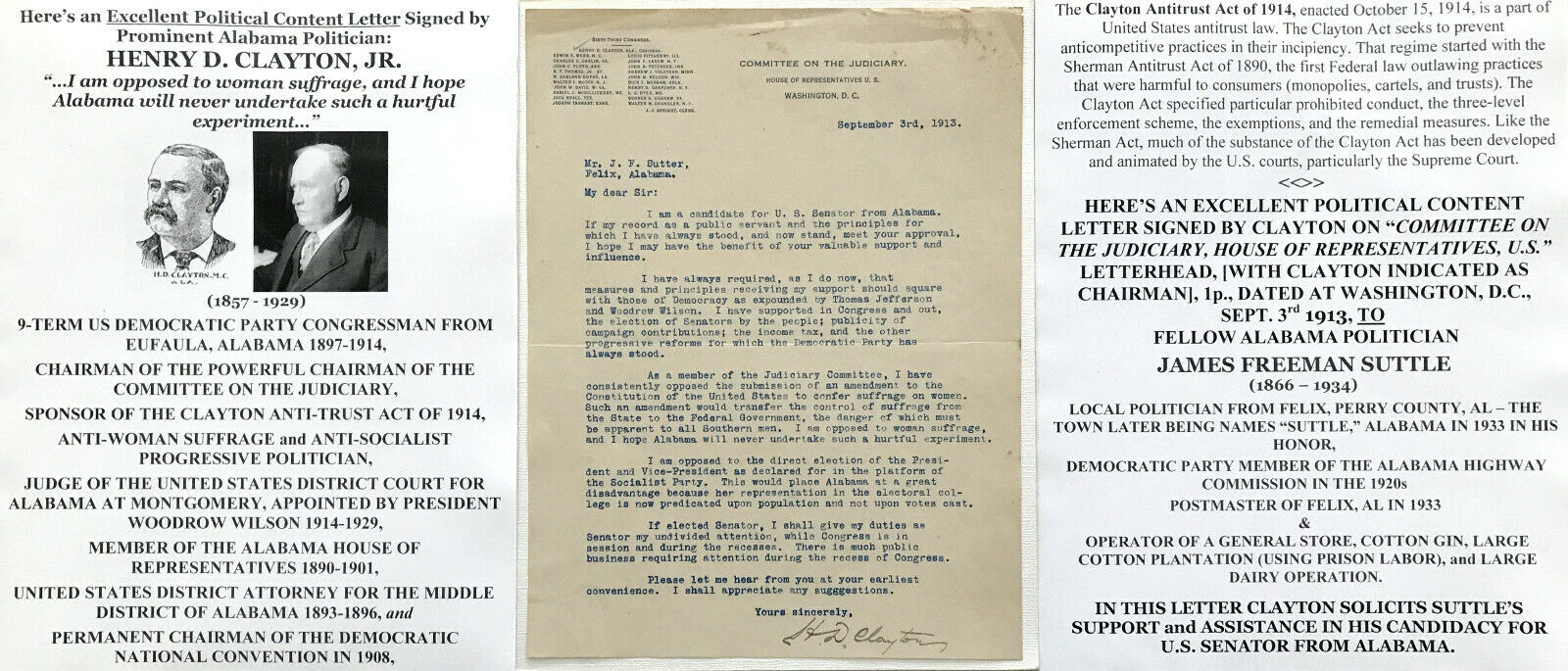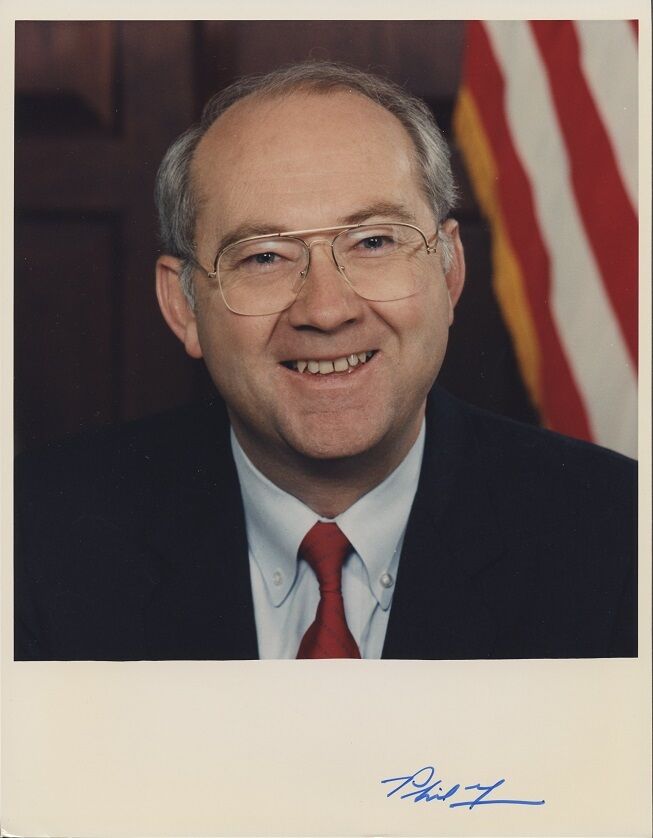-40%
ANTI-SOCIALIST & WOMEN SUFFRAGE CONGRESSMAN ALABAMA CLAYTON LETTER SIGNED 1913 !
$ 5.27
- Description
- Size Guide
Description
Here’s anExcellent Political Content Letter
Signed by Prominent Alabama Politician:
HENRY D. CLAYTON, JR.
“…I am opposed to woman suffrage, and I hope Alabama will never undertake such a hurtful experiment…”
(1857 - 1929)
9-TERM US DEMOCRATIC PARTY CONGRESSMAN FROM EUFAULA, ALABAMA 1897-1914,
CHAIRMAN OF THE POWERFUL CHAIRMAN OF THE COMMITTEE ON THE JUDICIARY,
SPONSOR OF THE CLAYTON ANTI-TRUST ACT OF 1914,
ANTI-WOMAN SUFFRAGE and ANTI-SOCIALIST PROGRESSIVE POLITICIAN,
JUDGE OF THE UNITED STATES DISTRICT COURT FOR ALABAMA AT MONTGOMERY, APPOINTED BY PRESIDENT WOODROW WILSON 1914-1929,
MEMBER OF THE ALABAMA HOUSE OF REPRESENTATIVES 1890-1901,
UNITED STATES DISTRICT ATTORNEY FOR THE MIDDLE DISTRICT OF ALABAMA 1893-1896,
and
PERMANENT CHAIRMAN OF THE DEMOCRATIC NATIONAL CONVENTION IN 1908,
The
Clayton Antitrust Act of 1914,
ena
cted October 15, 1914, is a part of
United States antitrust law
. The Clayton Act seeks to prevent anticompetitive practices in their incipiency. That regime started with the
Sherman Antitrust Act
of 1890, the first Federal law outlawing practices that were harmful to consumers (monopolies, cartels, and trusts). The Clayton Act specified particular prohibited conduct, the three-level enforcement scheme, the exemptions, and the remedial measures. Like the Sherman Act, much of the substance of the Clayton Act has been developed and animated by the
U.S. courts
, particularly the
Supreme Court
.
<
<>
>
HERE’S AN EXCELLENT POLITICAL CONTENT LETTER SIGNED BY CLAYTON ON “
COMMITTEE ON THE JUDICIARY, HOUSE OF REPRESENTATIVES, U.S.”
LETTERHEAD, [WITH CLAYTON INDICATED AS CHAIRMAN], 1p., DATED AT WASHINGTON, D.C., SEPT. 3
rd
1913
,
TO
FELLOW ALABAMA POLITICIAN
JAMES FREEMAN SUTTLE
(1866 – 1934)
LOCAL POLITICIAN FROM FELIX, PERRY COUNTY, AL – THE TOWN LATER BEING NAMES “SUTTLE,” ALABAMA IN 1933 IN HIS HONOR,
DEMOCRATIC PARTY MEMBER OF THE ALABAMA HIGHWAY COMMISSION IN THE 1920s
POSTMASTER OF FELIX, AL IN 1933
&
OPERATOR OF A GENERAL STORE, COTTON GIN, LARGE COTTON PLANTATION (USING PRISON LABOR), and LARGE DAIRY OPERATION.
IN THIS LETTER CLAYTON SOLICITS SUTTLE’S SUPPORT and ASSISTANCE IN HIS CANDIDACY FOR U.S. SENATOR FROM ALABAMA.
CLAYTON DISCUSSES HIS POLITICAL VIEWS “…
OF DEMOCRACY AS EXPOUNDED BY PRESIDENT THOMAS JEFFERSON AND WOODROW WILSON…
;”
OF HIS SUPPORT FOR THE DEMOCRATIC PARTY’S PROGRESSIVE SENATORS; HIS OPPOSITION TO THE SOCIALIST PARTY; and MORE...
The document measures 8” x 10½”and is in VERY GOOD+ CONDITION, with a light touch of soiling at the upper right margin, away from an text.
A FINE PIECE of ALABAMA POLITICAL HISTORY.
<><
::
><>
BIOGRAPHY of the HONORABLE
HENRY D. CLAYTON
Henry De Lamar Clayton Jr.
(February 10, 1857 – December 21, 1929) was a
United States Representative
from
Alabama
and a
United States District Judge
of the
United States District Court for the Middle District of Alabama
and the
United States District Court for the Northern District of Alabama
.
Education and career
Born on February 10, 1857, near
Clayton
, in
Barbour County
,
Alabama
, Clayton attended the common schools, then received an
Artium Baccalaureus
degree in 1877 from the
University of Alabama
and a
Bachelor of Laws
in 1878 from the
University of Alabama School of Law
. He was admitted to the bar and entered private practice in Clayton from 1878 to 1880. He continued private practice in
Eufaula
, Alabama from 1880 to 1914. He was a register in chancery for Barbour County from 1880 to 1884. He was a member of the
Alabama House of Representatives
from 1890 to 1891. He was the
United States Attorney
for the Middle District of Alabama from 1893 to 1896. He was permanent Chairman of the
Democratic National Convention
in 1908.
Congressional service
Clayton was elected as a
Democrat
to the
United States House of Representatives
of the
55th United States Congress
and to the eight succeeding Congresses and served from March 4, 1897, until May 25, 1914, when he resigned and moved to
Montgomery
, Alabama to accept a federal judgeship. He was Chairman of the
United States House Committee on the Judiciary
for the
62nd
and
63rd United States Congresses
. He was sponsor of the
Clayton Antitrust Act of 1914
.
He was one of the managers appointed by the House of Representatives in 1905 to conduct the impeachment proceedings against
Charles Swayne
, Judge of the
United States District Court for the Northern District of Florida
, and in 1912 against
Robert W. Archbald
, Judge of the
United States Commerce Court
. He was appointed to the
United States Senate
to fill the vacancy caused by the death of
United States Senator
Joseph F. Johnston
, but his appointment was challenged and withdrawn.
Federal judicial service
Clayton was nominated by President
Woodrow Wilson
on May 2, 1914, to a joint seat on the
United States District Court for the Middle District of Alabama
and the
United States District Court for the Northern District of Alabama
vacated by Judge
Thomas G. Jones
. He was confirmed by the
United States Senate
on May 2, 1914, and received his commission the same day. His service terminated on December 21, 1929,
due to his death in Montgomery. He was interred in Fairview Cemetery in Eufaula.
Family
Clayton's father,
Henry DeLamar Clayton
, was a Major General in the
Confederate States Army
. His brother,
Bertram Tracy Clayton
, was a United States Representative from
New York
.
Home
Clayton's home in Clayton, the
Henry D. Clayton House
, was declared a
National Historic Landmark
in 1976.
BIOGRAPHY OF JAMES F. SUTTLE
James Freeman Suttle
, alternately referred to in historical sources as James, J. F., and J. Freeman Suttle, was the eighth and last child of John White and Rebecca Jane Smith Suttle. He was born in Perry County on January 2, 1866 and was raised at the family's plantation house about three miles north of the present-day Suttle community.
Suttle married Lucille “Angie” Jones in 1898. The 1910 census records James F. Suttle, Sr., age forty-four, a merchant operating a general store, living with his wife Angie and children James F, Jr., Pettus, John, Walter, and Roger, and two boarders. He is listed in the 1920 census as J. Freeman Suttle, a farmer and the family had grown to include a daughter by that time. Living next door in a rented house was Dr. D. A. Mason and his family.
Suttle was appointed by the Governor to serve on the state Highway Commission on October 1, 1923, and served as the Commissioner of Maintenance. The 1930 census for the Suttle family is essentially the same as that of the 1920 census, with Walter no longer listed and two boarders still living with the family. The Alabama Official and Statistical Register for 1923 provides the following biographical information:
JAMES FREEMAN SUTTLE
, Associate Highway Commissioner, of Felix, Perry County, was born January 2, at Perryville in that county; son of John White and Rebecca Jane (Smith) Suttle, the former of Augusta, Ga., the latter of South Carolina; grandson of Wm. and Elizabeth Suttle of Georgia and of Solomon and Elizabeth Smith of South Carolina. The family is originally from Scotland and settled in Rutherford County, N.C. Commissioner Suttle was educated in the primary schools of Perry County and spent one year at Marion Military Institute under the late Col. J. T. Murfree(1886-87). He was postmaster at his home town for 22 years and served six years as a Jury Commissioner.
He was one of the committee who selected delegates from Perry County to the Congressional Convention that nominated Oscar W. Underwood to his first Congressional service.
Suttle is a Democrat; a Baptist; an Odd Fellow.
He married Angie Lucile, the daughter of James Wylie and Hanie Elizabeth Jones, at Daleville, Miss., on June 8, 1897.
During the days of the old State Militia, Mr. Suttle served as Lieutenant in the 3rd Alabama Infantry Regiment for four years.
Freeman Suttle operated the family's farm and under his management it expanded from primarily a cotton plantation to a diversified agricultural enterprise. It is unclear whether or not he or his father began a dairy at the site, but the family recalls that it became a large operation utilizing four separate farms. Butter and milk was sold to markets in the region. With their other agricultural interests, including cotton and crops, the family at one time controlled about 12,000 acres. Freeman Suttle began diversifying into pork, chicken, and beef production in the early twentieth century. He became a registered pig breeder of the American Berkshire Association and their Record of1914 lists the pedigrees of thirteen boars and five sows.
The1922 American Aberdeen-Angus Herd Book records ten cows and two bulls belonging to Suttle.
Suttle also built and operated a general store and a cotton gin. The dairy operations were largely curtailed in favor of beef cattle and pork in the early twentieth century. About that time, the gin was converted into a mill to make feed for the animals.
The Suttles made use of prison labor on their farms and are named in two federal peonage complaints dating from the late 1930s. The use of convict labor and contracts for labor in exchange for debt were common practices in Alabama. Peonage occurred when the arrangement constituted an involuntary form of servitude or slavery and was outlawed in 1867. While no record was found of the outcome of the complaints, it seems likely that an operation as large as the Suttle's that relied to a degree on convict labor would be subject to such complaints.
James Freeman Suttle, Sr. died in December 1934. Farming operations were then carried out by his sons James Freeman Suttle, Jr. and Pettus
Suttle. The Suttle family gradually reduced its farming operations beginning starting circa 1950.
<>
SUTTLE,
Perry County, Alabama Catherine M. Lewis and J. Richard Lewis, in Jim Crow America: A Documentary History, reference a letter from Freeman Suttle to H.H. Warren dated October 10, 1912 “regarding the possible employment of Henry Johnson, a black man, as Warren's assistant. Warren's reluctance to hire Johnson evokes from Suttle an unusual statement that 'a negro of the right kind would beat a cheap white man.'” They added the following commentary: “While that may seem faint praise, for some southerners to affirm a blackman's worth was exceptional.”
<<>>
Suttle
, also known as
Felix
, is an
unincorporated community
in
Perry County
,
Alabama
, United States. Suttle is located on Alabama State Route 14, 10.6 miles (17.1 km) southeast of
Marion
.
History
Suttle is named for the family of James F. Suttle, who served as the postmaster in 1933. A post office operated under the name Felix from 1880 to 1933 and under the name Suttle from 1933 to 1973. James Suttle, who served on the Alabama Highway Commission as the Commissioner of Maintenance in 1923, operated a general store,
cotton gin
, and cotton farm in Suttle. He also operated a large dairy farm.
I am a proud member of the Universal Autograph Collectors Club (UACC), The Ephemera Society of America, the Manuscript Society & the American Political Items Collectors (APIC) (member name: John Lissandrello). I subscribe to each organizations' code of ethics and authenticity is guaranteed. ~Providing quality service & historical memorabilia online for over twenty years.~
WE ONLY SELL GENUINE ITEMS, i.e., NO REPRODUCTIONS, FAKES OR COPIES!











